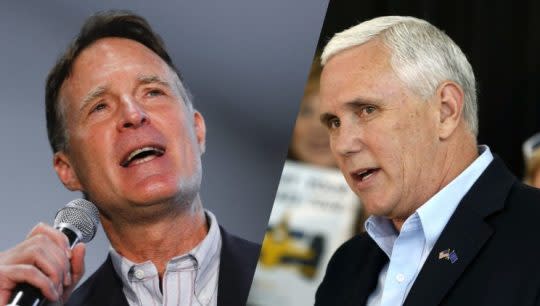How Trump's VP pick and a familiar name could help Indiana Democrats

After years of fighting what has been a mostly losing battle, Indiana Democrats received some good news in the past week. But observers caution that a reversal of fortune in the race for governor and Senate could be short-lived.
It all began last week with increased speculation that controversial Gov. Mike Pence was the favored candidate to be Republican frontrunner Donald Trump’s vice president. This was followed on Monday by a CNN report that former Indiana Sen. Evan Bayh would run in the Senate race to replace retiring Republican Dan Coats. Speculation increased further after the original Democratic nominee, Baron Hill, officially withdrew from the race, presumably to clear the way for Bayh.
Bayh served in the Senate until 2010, when he ceded the seat to Coats. He had previously served as governor from 1989 until 1997.
His arrival in the race comes as a boon for the larger party’s efforts to take back the Senate but also for state Democrats, who have recently suffered a decline in influence.
Andrew Downs, a political science professor at Indiana University-Fort Wayne and director of the Downs Center for Indiana Politics, said that while Bayh’s record has been “romanticized” recently, he still pegged his chances as “pretty good.”
“He has good name recognition and has always been viewed as a moderate Democrat, something that matches the political climate of Indiana,” Downs said, calling his track record in Indiana an “electoral force.”
Bayh’s campaign will be bolstered by over $9 million in cash left over from his 2010 run, a figure significantly higher than the $1.2 million his would-be Republican opponent, Rep. Todd Young, has at his disposal.
The 60-year-old has name recognition from his previous stint in the Senate, as well as notoriety stemming from his father, Birch Bayh, who was also a respected senator.
The younger Bayh has had success running in a presidential election year. He won the governorship by seven points in 1988 when George H.W. Bush won the state by 20. Similarly, he earned re-election to the Senate in 2004 by 24 points when George W. Bush won the Hoosier State by 20 points.
But Bayh’s bid to return to Washington is not considered a slam-dunk. Downs noted that Bayh’s last-minute decision not to run in 2010 “cost him political capital,” and his recent work in Washington as a corporate lawyer has frustrated some.
Republicans have already begun tying Bayh to President Obama and presumptive Democratic nominee Hillary Clinton.
“Evan Bayh cast the deciding vote for Obamacare, and then left Indiana to live full-time in D.C. Todd Young will beat him this November,” National Republican Senate Committee Director Ward Baker tweeted Monday morning.
The news of Bayh’s candidacy comes on the heels of rumors that Gov. Mike Pence is a top vice presidential candidate for Trump. Since state law prohibits candidates from running for state and federal offices simultaneously and the deadline is looming for candidates to file or withdraw their candidacy, Republicans would have to act quickly if Pence decides to drop out.
Pence was thought to be a popular and trusted conservative in the Hoosier state and many considered him a rising star in the party. But his tenure became marred by controversy stemming from his support of the 2015 Religious Freedom Restoration Act (RFRA), which prohibits the state from infringing on citizen’s religious rights unless absolutely necessary.
The fallout hampered Pence, according to political writer and talk show host Adbul Hakim-Shabazz, and the governor’s own attempt at spin was largely ineffective. Pence’s interview on This Week with George Stephanopoulos was described as “disastrous” in an Indianapolis Star article.
“There’s been shameless rhetoric about my state and about this law and about its intention all over the Internet. People are trying to make it about one particular issue. And now you’re doing that, as well,” Pence told Stephanopoulos, as the anchor attempted to ask him whether a baker could refuse to make a cake for a gay wedding. “Tolerance is a two-way street.”
While legislators amended the bill to try and prevent any anti-LGBT discrimination, his approval rating continued to fall. Sixty-two percent of Hoosiers approved of Pence in a Nov. 2014 WISH-TV/Ball State University poll. The same poll a year later put his approval rating at 49 percent.
“Hoosiers are by nature pretty even-keeled,” Hakim-Shabazz said. “This political year has been anything but. Everyone thought Pence would skate to re-election but now, not so much.”
After the RFRA, Democrats homed in on this vulnerability, nominating state Rep. John Gregg to unseat Pence. Despite the fact that he is running against an incumbent in a red state, Gregg has managed to remain within striking distance. A poll from last month has Pence with a narrow lead, 40 points to Gregg’s 36.
“A lot of what we call ‘Mitch Daniels Republicans’ have gone south and soured on Mike Pence,” Hakim-Shabazz said, referring to Pence’s predecessor. “The saving grace is that they don’t necessarily trust Gregg.”
The game changer could be if Pence becomes Trump’s vice presidential pick. Pence will receive a tryout Tuesday when he will introduce Trump at a rally in suburban Indianapolis.
Pence’s absence could actually help Republicans in the race if they can coalesce around a candidate, according to Downs.
“The Gregg campaign … has to work on a shift in campaign strategy,” he said, adding that much of his focus is on the Pence’s support of RFRA. “The potential benefit [for Republicans] is that negatives attached to Mike Pence disappear.”
Hakim-Shabazz said the national media is overstating the Democrats’ chances in the state, suggesting that perhaps liberal Hoosiers shouldn’t get their hopes up for a renaissance.
“Is [Pence] in danger? I wouldn’t go that far,” he said. “If you only watch the Indianapolis media, you would think the world is coming to an end, … but the rest of the state views him differently.”

